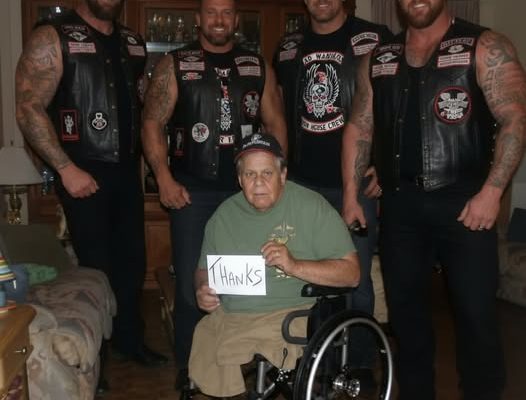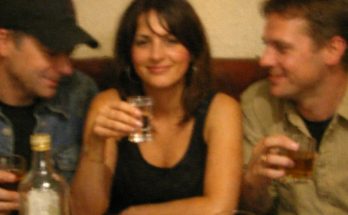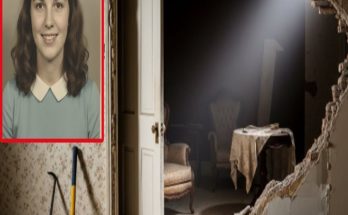The bikers showed up at my dad’s house after he lost his legs and he cried for three hours straight. I’d never seen my father cry before.
Not when my mother died. Not when the doctors told him he had diabetes. Not even when they amputated his right leg below the knee two years ago.
But when four massive men in leather vests walked through his front door unannounced, my father—my tough, stoic, Vietnam veteran father—broke down sobbing.
I was in the kitchen making him lunch when I heard the motorcycles. Four of them. The sound rattled the windows. My father’s neighborhood was quiet. Retired people. Neat lawns. Nobody rode motorcycles here.
I looked out the window and saw them parking in our driveway. Four huge men covered in tattoos. Wearing vests that said “Iron Warriors MC” with patches I didn’t recognize.
My first thought was they had the wrong house. My second thought was I should call the police.
But then I heard my father’s voice from the living room. “Oh my God. Oh my God, you came. You actually came.”
I rushed in and found him trying to wheel his chair toward the door. He’d lost his second leg three weeks ago. Same diabetes that took the first one. The doctors said he’d never walk again. Said he’d need round-the-clock care. Said we should start looking at nursing homes.
My father had stopped talking after that appointment. Just sat in his wheelchair staring at nothing. Wouldn’t eat. Wouldn’t watch TV. Wouldn’t even look at me when I tried to talk to him.
I thought he was giving up. Thought he was waiting to die.
But now he was crying and wheeling himself frantically toward these four strange bikers who’d just walked into his house like they owned it.
The tallest one—maybe 6’5″ with a gray beard down to his chest—knelt in front of my father’s wheelchair. “Hello, brother. We got your letter. We came as fast as we could.”
“What letter?” I stepped forward. “Who are you people? How did you get this address?”
My father was still crying. Reaching out to touch the man’s vest like he couldn’t believe he was real. “Tommy? Is that really you? After all these years?”
The biker—Tommy—had tears in his eyes too. “It’s me, Sarge. It’s really me.”
“I don’t understand,” I said. My voice was shaking. “Dad, who are these people?”
My father looked at me. Really looked at me for the first time in three weeks. “Son, these are my brothers. These are the men who saved my life in Vietnam fifty-two years ago.”
I stood there stunned. My father never talked about Vietnam. Never. Not once in my entire thirty-eight years had he mentioned specific people or specific events. Just said he served, said it was hell, and changed the subject.
Tommy stood up slowly. The other three bikers moved into the room. They were all roughly my father’s age—late sixties, early seventies. All covered in tattoos. All wearing those leather vests with military patches mixed in with motorcycle club patches.
“Your father saved our lives,” one of them said. He was shorter but just as muscular. His vest had a patch that said “Rabbit.” “January 17th, 1971. Our platoon got ambushed outside Da Nang. We were pinned down. Your father ran through enemy fire to pull four of us to safety. Got shot twice doing it. Earned a Silver Star.”
“I didn’t know,” I whispered. I looked at my father. “Dad, you never told me.”
My father wiped his eyes. “Because I lost twelve men that day, son. Saved four. Lost twelve. That’s not something I’m proud of.”
“But you’re a hero—”
“I’m not a hero.” My father’s voice was firm. “I’m just a man who did what he had to do. Just like these men did what they had to do. We survived together. We came home together. And then we lost touch.”
Tommy knelt again. “We didn’t lose touch on purpose, Sarge. You disappeared. Changed your phone number. Moved. We tried to find you for years.”
“I know,” my father said quietly. “I was ashamed. I came home broken. Had nightmares. Couldn’t hold a job. Couldn’t be around people. I pushed everyone away. Including you guys.”
“But we never forgot you,” the one called Rabbit said. “Never stopped looking.”
The third biker spoke up. He was wearing a Vietnam Veteran cap. “Two months ago, someone posted a picture in a veteran’s Facebook group. Asking if anyone knew a Sergeant William Morrison who served with Charlie Company. Said his son was looking for information.”
I felt my face flush. “That was me. I posted that. Dad’s been so depressed since the surgery. I thought maybe connecting with old war buddies might help. I never thought anyone would actually respond.”
“We responded within an hour,” the fourth biker said. He had a scar across his face. “Soon as we saw that picture, we knew it was our Sarge. We’ve been planning this trip ever since.”
“Planning what trip?” my father asked.
Tommy smiled. “Sarge, we didn’t just come to visit. We came to take you riding.”
My father’s face crumpled. “I can’t ride. I don’t have legs anymore. I can’t even walk.”
“You don’t need legs to ride,” Tommy said. “You just need heart. And brother, you’ve got more heart than anyone I’ve ever known.”
He pulled out his phone and showed my father a picture. It was a motorcycle. But not a regular motorcycle. This one had been completely modified. No foot pegs. The seat was different. There were handles and supports I didn’t recognize.
“This is a custom trike built specifically for disabled veterans,” Tommy explained. “No legs required. You steer with your hands. Brake with your hands. Everything is hand controls.”
My father stared at the picture. “Where did you get this?”
“We built it. All four of us. Took us six weeks. We have a brother in the club who’s a mechanic. Another who’s a welder. We pooled our money and our skills and we built you a bike.”
“It’s in the trailer outside,” Rabbit added. “Custom paint job. Your name on the tank. Your rank. Your unit. Everything.”
My father’s hands were shaking. “I can’t accept that. That must have cost thousands of dollars.”
“Cost us about twelve grand,” Tommy said matter-of-factly. “Worth every penny. You saved our lives fifty-two years ago. This is us returning the favor.”
“But I’m not dying—”
“Yes, you are.” The biker with the scar spoke firmly. “We’ve been watching your son’s posts. Watching you give up. Watching you fade away. You are dying, Sarge. Not from diabetes. From losing hope. We’re here to give you a reason to live.”
My father looked at me. Tears streaming down his face. “You’ve been posting about me?”
“I’ve been worried about you, Dad. You stopped talking. Stopped trying. I didn’t know what else to do.” I was crying too now. “I thought if I could find your old friends, maybe they could help. Maybe they could remind you of who you used to be.”
Tommy stood up and put his hand on my shoulder. “Your son did exactly the right thing. He reached out to your brothers. And brothers don’t leave brothers behind. Not in Vietnam. Not now.”
The four bikers spent the next hour showing my father the bike. They’d brought a laptop with detailed photos and videos. Showed him every modification. Explained how everything worked. Promised him they’d teach him to ride it safely.
My father’s transformation was incredible. Color returned to his face. His eyes lit up. He started asking questions, making jokes, laughing. The man who’d been silent for three weeks suddenly couldn’t stop talking.
“There’s one more thing,” Tommy said. He pulled an envelope from his vest. “We’re part of a riding club called the Iron Warriors. We’re all combat veterans. All riders. All brothers. We’d like you to join us, if you’re willing.”
“I haven’t ridden a bike in forty years,” my father protested.
“Doesn’t matter. Once a rider, always a rider. Once a warrior, always a warrior.” Tommy opened the envelope and pulled out a leather vest. Just like theirs. Black leather. Iron Warriors patches. And a name patch that said “Sarge.”
“We already voted you in,” Rabbit said. “Unanimous decision. You’re a warrior. You belong with warriors.”
My father took the vest with trembling hands. Held it like it was made of gold. “I don’t know what to say.”
“Say yes,” the scarred biker said. “Say you’ll ride with us. Say you’ll live.”
My father looked at all four of them. These men he’d served with half a century ago. These men who’d tracked him down and built him a motorcycle and driven hundreds of miles to give him hope.
“Yes,” he whispered. “Yes, I’ll ride with you.”
They helped him put on the vest. It fit perfectly. He looked like a different man. Not a depressed amputee in a wheelchair. But a warrior. A biker. A brother.
Tommy knelt one more time. “Sarge, we’ve got a ride planned. Three hundred miles through the mountains. Stops at every major veteran’s memorial along the way. Six other disabled vets from our club are joining us. All of them riding modified bikes. All of them proving that losing limbs doesn’t mean losing life.”
“We leave in two weeks. That gives you time to heal. Time to practice on the bike. Time to get ready.” He paused. “Will you come with us?”
My father didn’t hesitate. “Absolutely. I’ll be ready.”
Over the next two weeks, those four bikers showed up every single day. They brought the bike. Set it up in our driveway. Taught my father how to mount it, how to control it, how to ride it safely.
Our quiet neighborhood suddenly had motorcycles every afternoon. The neighbors complained at first. But then they saw what was happening. Saw four men patiently teaching a double amputee how to ride. Saw my father’s transformation from depressed to determined.
The complaints stopped. People started coming out to watch. To cheer. To offer encouragement.
My father practiced for hours every day. Built up his upper body strength. Learned to trust the bike. Learned to trust himself again.
Two weeks later, we loaded the bike into a trailer and drove to the meetup point. Twelve bikers total. Seven of them were disabled veterans—missing legs, arms, eyes. All of them riding modified bikes. All of them living proof that disability doesn’t mean defeat.
My father looked at these men. These warriors. These survivors. And for the first time since losing his legs, he smiled a real smile.
“Thank you,” he said to Tommy. “Thank you for not forgetting me. Thank you for finding me. Thank you for giving me a reason to keep going.”
Tommy hugged him tight. “Brother, we will never forget you. And we will never let you give up. That’s what brothers do.”
They rode for three days. Three hundred miles through mountains and valleys. Stopped at the Vietnam Memorial. The Korean War Memorial. The World War II Memorial. Paid respects to fallen brothers. Told stories. Cried. Laughed. Lived.
My father called me every night. His voice was different. Stronger. Happier. Alive.
“Son, I wish you could see this. I wish you could feel what I’m feeling. I’m free. For the first time since I lost my legs, I feel free.”
When he came home, he was a changed man. He started attending Iron Warriors meetings. Started going on group rides. Started volunteering at the VA hospital, visiting other disabled vets, telling them his story, showing them his bike.
“If I can ride with no legs,” he’d tell them, “you can do whatever you dream of doing. Don’t let your disability define you. Don’t let it defeat you.”
Six months later, my father had helped three other disabled veterans get modified bikes. Had raised money to help pay for them. Had organized a charity ride that raised $50,000 for wounded warriors.
The man who’d been ready to die was now saving lives.
Last month was the one-year anniversary of when Tommy and the others showed up. My father organized a celebration ride. Twenty-three disabled veterans participated. Some were amputees. Some were blind. Some had PTSD. All of them were warriors. All of them were riders.
I rode behind them on my own bike—I’d bought one specifically so I could ride with my dad. Watching these men roll down the highway, flying American flags, proving that nothing can defeat the warrior spirit—it was the most beautiful thing I’ve ever seen.
At the end of the ride, my father gave a speech. Standing—well, sitting in his wheelchair, but standing in every way that mattered—in front of a hundred people.
“A year ago, I wanted to die. I’d lost my legs. I’d lost my hope. I’d lost my purpose. I was just waiting for the end.” He paused. “But then four angels showed up. Four men I’d served with fifty-two years ago. Four brothers who refused to let me quit. They built me a bike. They gave me a vest. They gave me a reason to live.”
“They reminded me that warriors don’t surrender. We don’t give up. We adapt. We overcome. We ride.”
He looked at Tommy, Rabbit, and the others. “These men saved my life twice. Once in Vietnam when they let me pull them to safety. And once in my living room when they pulled me back from the edge of giving up.”
“I will never be able to repay that debt. But I can pay it forward. I can help other veterans find their reason to ride. Their reason to live.”
There wasn’t a dry eye in the crowd. These tough, tattooed bikers were openly crying. My father was crying. I was crying.
After the speech, an elderly woman approached my father. She was maybe eighty years old. “Excuse me, are you Sergeant William Morrison?”
My father nodded. “Yes, ma’am.”
“My husband served with you in Vietnam. His name was David Chen. He died in that ambush in 1971. He was one of the twelve you couldn’t save.”
My father’s face went white. “Ma’am, I’m so sorry. I tried to get to him. I tried to save everyone—”
She put her hand on his. “I know you did. David’s friend wrote me a letter after he died. Told me about a sergeant who ran through enemy fire trying to save everyone. Who got shot twice but kept going. Who carried my husband’s body back so it could be sent home.”
She pulled out a worn photograph. It showed a young soldier. Smiling. Alive. “This is David. He was twenty-two when he died. We’d been married for six months.”
“I’m so sorry,” my father whispered.
“Don’t be sorry. Be proud. You gave me closure. You brought my husband home. You did everything humanly possible.” She smiled through her tears. “And now you’re helping other warriors live. That would make David so happy.”
She handed my father a folded flag. “This is David’s funeral flag. I’ve kept it for fifty-two years. I want you to have it. I want you to carry it on your rides. Let David ride with you. Let him be part of this beautiful thing you’re doing.”
My father took the flag with shaking hands. “Ma’am, I can’t—”
“Yes, you can. Please. Let my husband’s memory live on through your work. Let him help save the warriors he couldn’t save himself.”
My father attached that flag to his bike. It flies on every ride now. A reminder that the warriors we lost are still with us. Still inspiring us. Still teaching us to never give up.
The bikers who showed up at my father’s house saved his life. But in doing so, they started something bigger. A movement of disabled veterans refusing to be defeated. Adapting. Overcoming. Riding.
My father is seventy years old with no legs. And he’s living more fully than most people with all their limbs intact.
Because he learned what Tommy told him that first day: You don’t need legs to ride. You just need heart.
And my father has the heart of a warrior.



